1. Our Group
This Blog is associated with the Peer-Mentoring-Group “Neutestamentliche Wissenschaft.” This organisation is funded by the UZH Graduate Campus and aims at supporting junior researchers at the UZH Zurich. To achieve this general goal, our own Peer-Mentoring-Group follows three main strategies: (1) We want to create an atmosphere in which independent thinking as well as synergetic effects can thrive. Regular lunch meetings at which everybody is welcome to ask for advice on specific issues and where scholars can have general discussions about their research are an important part of implementing such an academic culture. (2) Different educational biographies lead to a great variety of competences among junior researchers. In methodological workshops we can learn from the expertise of our colleagues. Further, we invite external experts to teach skills that are helpful in the study of early Christianity. (3) While methodological competency is an important aspect of qualifying young researchers for the variegated job market, specific advice on important issues relating to academic careers is also a crucial aspect of postgraduate education. Hence, we organise workshops and seminars that are of relevance in that regard.
2. The Idea for this Blog
The idea for this blog goes back to an event that belongs to category no. 3 mentioned above. On July 5th, Wayne Coppins visited us to talk to us about “Bridging the German-English Divide: Wie können wir die Kluft zwischen englisch- und deutschsprachiger Forschung überwinden?”
Wayne is Associate Professor of Religion at the University of Georgia and known for his untiring contribution to the cross-linguistic discussion of the New Testament writings. In particular, he deserves credit for having established the Baylor-Mohr Siebeck Studies in Early Christianity series, which he co-edits with Simon Gathercole. Moreover, his Blog German for Neutestamentler is an important online resource for English-speaking NT scholars who are interested in German-speaking scholarship.
In our seminar, Wayne gave a two-part lecture (in German!) in which he spoke about (1) contexts, causes, and perceptions of the gap (“Kontexte, Ursachen und Wahrnehmungen der Kluft”) and about (2) the potential benefits and limits of English publications as a solution to the problem on the German-speaking side (“Englisch als Problemlösung auf der deutschsprachigen Seite?”).
His argument in the first part was built on the observation that, because of several different factors, German-speaking scholarship no longer has a “Führungsrolle” in NT studies. Still, it should be regarded as a valid “Gesprächspartner” from his perspective. Unfortunately, there are dynamics within the field that do not encourage such a dialogue. On the Anglophone side, some – though certainly not all – English-speaking scholars tend to discredit or marginalize German scholarship with slogans such as “not original enough,” “too traditionalist,” etc. in order to avoid having to interact with German literature, which is – after all – a very time-consuming occupation.This “laziness” might be understandable, but it is not justifiable, according to Wayne. Still, there may indeed be real weaknesses in the German system (strong polemic against other views, hierarchical structures that can discourage creative advances within the field, etc.), which can make it all too easy for English-speaking authors to find good excuses for not interacting with German scholarship.
In the discussion of this part of the workshop it became clear that the people present had differing ideas about the extent to which each party was to blame for the current problematic situation.
-
One question that was raised, for example, was whether it was even appropriate to expect scholars from the Anglophone world to learn German these days or whether this is only a desirable but not necessary skill.
-
Also, while Wayne had remarked that many PhD students learn German but then do not use it as often after they complete their dissertation, one could argue that this is still a great achievement in relative terms. To be sure, German-speaking scholars – at least junior researchers – will usually be more familiar with English than their Anglophone counterparts are with German. But given the fact that the former learn English at school and English is the leading world language, this is not a particularly noteworthy achievement. After all, should it not deserve recognition that so many non-native speakers who are studying for a PhD in NT studies still learn German – while we, on average, spend much less energy on learning another modern language, such as French?
-
Still, others would counter this consideration by arguing that it was not only for historical reasons but also in light of the current state of the field that German has had a certain priority over languages such as French and that it was not acceptable that many of the PhD theses published in notable series have often ignored key works on the subject simply because these works were written in German.
-
While we had different opinions on where exactly “desirable” language competencies transition into “obligatory” ones, we all agreed that the two categories were not simply coextensive. The flood of literature on any subject makes a selection of dialogue partners necessary and if German-speaking scholars do not want to be eliminated in that process, it will be up to them to make their research more visible in order to avoid being ignored.
Since some of the parameters of German-speaking scholarship make this more difficult from the beginning (e.g., the tendency of of German postdoctoral theses – i.e., Habilitationsschriften – to be so encyclopaedic that it is difficult to expect a non-native speaker to work through them), Wayne spoke in the second part of his presentation about strategies and tactics that might help German-speaking scholars to take part in the international discussion. Non-surprisingly – given his extensive work in that area – Wayne gave a valuable assessment of the role of English translations of German works. As with English publications by German-speaking scholars in general, he discussed both potential dangers and potential benefits (“Gefahr” vs. “Verheissung”): While a shift to English might function as a further limitation (“Begrenzung”) of the impact of German scholarship by giving English-speaking scholars the impression that they no longer need to (be able to) read the German publications themselves, this trend could also work as a window (“Fenster”) into German scholarship by helping non-native speakers to find access to ideas that are discussed in more detail in other German publications. Also, there are some conventions within German writing that – though they might be well-established – could easily be eliminated without losing reputation in the German sphere. Wayne explicitly sensitised us to the need to adjust our writing style to an English-speaking readership – both with regard to syntactical features and with regard to the tone of our discussion. Rounding off his specific suggestions with comments on social media, he then suggested that we should establish a “Zürich New Testament Blog” in order to make our research more easily accessible to researchers all over the world. And this is how we got here.
3. What to Expect
As should have become apparent in the last section, the decisive motive behind this blog is the aim to do justice to the “extra effort” that English native speakers can justifiably require from German-speaking scholars who want their work to be read and discussed. Accordingly, readers of this blog can expect specifically
-
posts on new publications that we have written,
-
posts on issues specifically related to our department (e.g., events), and
-
posts on other topics that are relevant to the English-German dialogue (e.g. discussions of important new studies that are published in lesser known series in German)
Thus, we hope that this blog might make at least a small contribution toward widening and deepening the trans-linguistic conversation on the NT and that many academics might profit from this resource.
While the authors are members of the “Peer-Mentoring-Group” mentioned at the beginning, we take a quite broad approach to defining “Zürich,” i.e., including various people who are or have been associated with the faculty – another, though minor, feature in which Wayne’s approach has had its effect on us (see his notion of the “‘German’ tradition” in Wayne Coppins, The Interpretation of Freedom in the Letters of Paul: With Special Reference to the “German” Tradition, WUNT II 261 [Tübingen: Mohr Siebeck, 2009], 5).
Christoph Heilig is working on an SNF-Project on “Narrative-Substructures in the Letters of Paul” with Prof. Jörg Frey. He is the author of Hidden Criticism? Methodology and Plausibility of the Search for a Counter-Imperial Subtext in Paul, WUNT II 392 (Tübingen: Mohr Siebeck, 2015) and Paul’s Triumph: Reassessing 2 Corinthians 2:14 in Its Literary and Historical Context, BTS 27 (Leuven: Peeters, 2016).

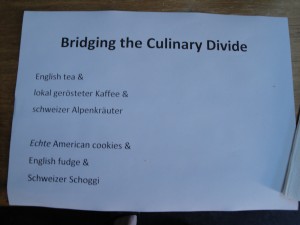
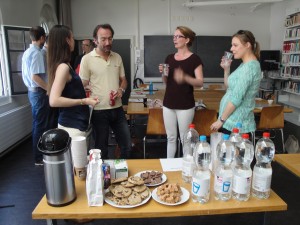
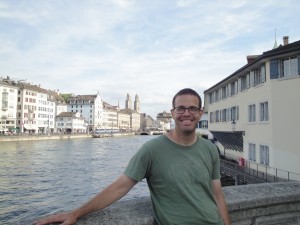
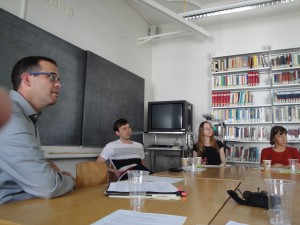
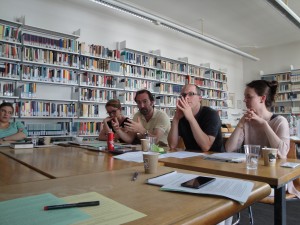
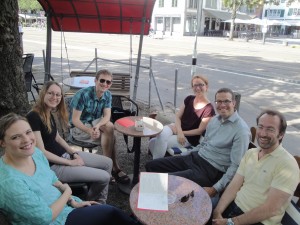
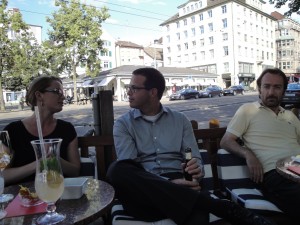
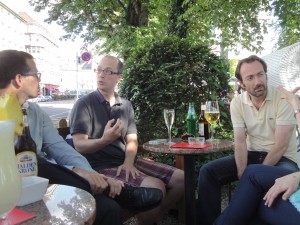
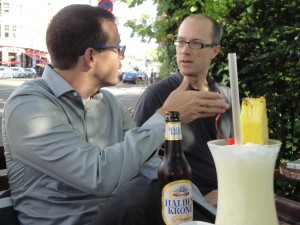
3 Kommentare vorhanden
1 Thomas Scott Caulley // Sep 6, 2016 at 4:08
Glad to hear of this endeavor. As for whether learning German is worth the effort, I heartily concur with the affirmative. Especially American students need the cross-cultural experience, and not just two weeks of vacation. My own experience in learning the language was (is) one of dogged determination and learning to live with the compromises of an imperfect skill. But my time in Germany (ca. twelve years, total) has been life-changing. I will always be grateful for the opportunity. Scott Caulley, Dr. Theol. (Universität Tübingen, 1983); Institutsleiter, Das Institut zur Erforschung des Urchristentums, Tübingen, 2002-2010.
2 Paul’s Triumph // Feb 2, 2017 at 9:08
[…] I would like to point back to the very first post on this blog, where I retell how it came into existence. It was Wayne Coppins’s suggestion to create the blog […]
3 Translation of Important Commentary on the Gospel of Luke // Dec 21, 2017 at 17:24
[…] the German-English-divide” in New Testament studies in general, you might like this summary of a workshop by Wayne here in […]
Kommentar schreiben